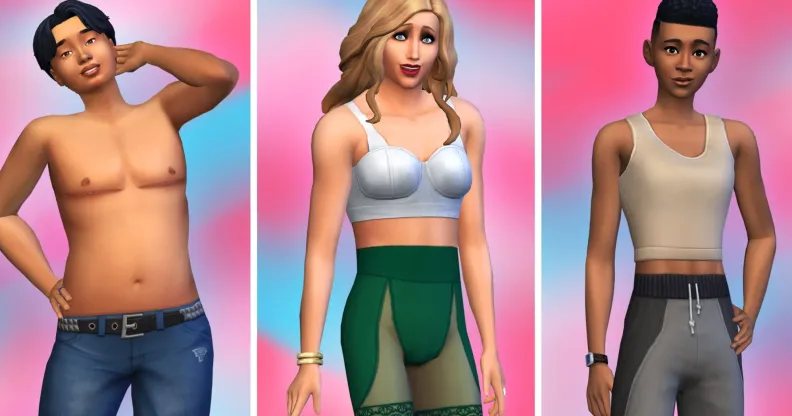Why The Sims 4’s new inclusion of transgender and disabled sims matters

Characters in The Sims 4 can now wear binders, shapewear, and have top surgery scars. (Twitter/@TheSims)
Characters in The Sims 4 can now wear binders, shapewear, and have top surgery scars. (Twitter/@TheSims)
The Sims is one of the bestselling franchises in gaming history. But unlike most other AAA games (high budget and high profile games produced by leading publishers), this open world life simulation game has no clear end goal.
Instead of following a quest format, The Sims offers gamers multiple possibilities for game play. Their simulated characters (known as “sims”) can work, socialise, develop skills and even age without being restricted to a linear path.
For example, players can train their sims to become renowned artists, devious thieves or culinary wizards. Their spare time can be spent on fun skill-building activities such as fishing, computer hacking or even ghost hunting. Sims can make friends, lose friends, get married, start families and eventually meet their end – with a grave their sim relatives can grieve over.
In its simulation of real world living, without real world limits, The Sims offers players the chance to embody characters that represent their true selves, aspirational selves, or an entirely different identity – it’s all down to the player’s choice.
In February 2023, The Sims 4 publisher EA Games released a free update that added new ways to customise the appearance of sims. This included medical wearables, indluding hearing aids and glucose monitors, as well as top surgery scars (the scars from surgery which changes the look of a person’s chest), binders and shape wear to denote transgender characters.
The addition of these features enhances the game’s representation of players who identify as transgender or having disabilities – a diversity not offered in the game’s original release in 2000.
Because of the nature of the life simulation game and the flexibility in how the game can be played, The Sims offers informal learning opportunities to its players.
The upcoming Growing Together Expansion Pack, for example, emphasises family interactions in which players can explore different ways to strengthen family bonds, take care of family members and raise a happy baby.
Players who identify as gender nonconforming or disabled can now, through The Sims, create a mirror of their reality and explore choices that may be more restricted in their real lives.
How The Sims overcomes gamer stereotypes
Gamers have long been stereotyped as white, male and heterosexual. Thanks to the increasing attention to equality, diversity and inclusion in the global market, the gaming industry has been including more characters from racial and ethnic minorities.
This includes the award-winning adventure series Life is Strange, which featured an Asian-American main character in its latest release, True Colors (2021), and Uncharted: The Lost Legacy (2017), the two female leads of which are Indian-Australian and African.
The representation of disabled and LGBTQ+ characters in games, however, has remained limited. This update from The Sims represents a major step in enabling some players to represent themselves in the gaming environment.
Not all players will find themselves represented, however. There is still no option to play as a sim in a wheelchair, for example, though some creative fans have built mods that allow them to do so.
What will the impact be on players?
Being able to play as diverse characters helps gamers to build up resilience by exploring their identity through an avatar. The visibility of their identity in The Sims serves as reminder that they are not alone with their feelings of gender or functional diversity.
This diversity of playable characters also helps to build connectedness within the gaming community, as many gamers vocally support each other and these developments.
The Sims 4 developments educate the values of equality, diversity and inclusion to gamers who don’t identify as minorities. Although not designed as an online multiplayer game – meaning players can’t interact with each other – non-minority gamers’ experiences interacting with the new character builds in The Sims may increase their familiarity and acceptance of others, which can be transferred to the real world.
In the future, we can expect more inclusive and diverse features within character design, particularly in the online multiplayer games where young people interact and socialise with each other.
As a gaming expert, I will be interested to see how non-minority players respond when they can interact with disabled and trans characters within the virtual environment, who may or may not represent the identity of the player behind the screen.![]()
This article is republished from The Conversation under a Creative Commons license. Read the original article.

